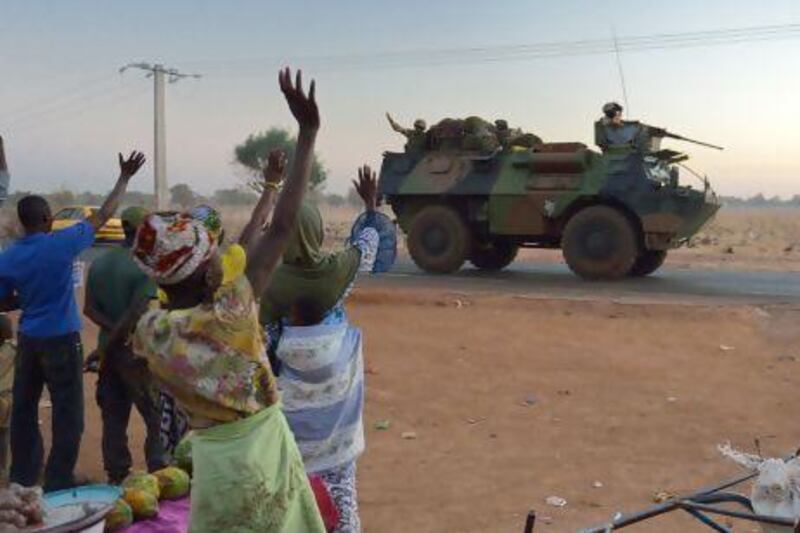BAMAKO // Islamist militants from northern Mali seized 41 western hostages yesterday in an attack on a gas installation in Algeria.
The attack came as French troops on the ground in Mali fought Islamist insurgents in close combat for the first time since France's intervention in the conflict.
Two people died in the dawn raid near the town of Ain Amenas, near the Libyan border, an apparent retaliatory strike after Algeria gave permission for French fighter jets to fly through its air space on their way to Mali.
One of the attackers said they were members of Al Qaeda and had come from northern Mali. "We belong to the Khaled Abul Abbas brigade led by Mokhtar Belmokhtar," he said. Belmokhtar is a veteran leader of the jihadist smuggling and kidnap gangs who have been growing in strength in the Sahara.
The insurgents said their hostages included seven Americans and French, British and Japanese citizens. A Norwegian and an Irish citizen are also thought to be among those held captive. The gas plant is jointly operated by BP, Statoil of Norway and Algeria's state-run energy company Sonatrach.
The US National Security Council said it was "monitoring the situation closely".
The incident will confirm Algeria's grave misgivings about any international intervention in Mali, with which it shares a 2,000-kilometre border.
Groups linked with the largely Algerian-led Al Qaeda in the Islamic Maghreb have held sway there since spring last year.
Suspicious of their former colonial masters, Algeria pushed for a negotiated solution to the problems in Mali. Along with other regional leaders, its authorities have expressed concern that war in Mali would destabilise the region.
On Monday, Algeria said it was closing its border with Mali because of the surprise military intervention by the French.
After days of airstrikes on Islamist positions in the northern territory seized by the Islamists in April, French and Malian troops battled the insurgents yesterday in the small town of Diabaly, about 400 kilometres north of the capital, Bamako.
"The special forces are currently in Diabaly, in close-quarter combat with the Islamists. The Malian army is also in place," a Malian security source.
Diabaly was seized on Monday by fighters led by Algerian Abou Zeid, one of the leaders of Al Qaeda in the Islamic Maghreb.
The French military said it had secured a strategic bridge on the Niger river near the town of Markala, south of Diabaly, blocking a key route to Bamako.
The French defence minister Jean-Yves Le Drian said the western zone where Diabaly lies was home to "the toughest, most fanatical and best-organised groups. It's under way there but it's difficult."
Key countries and organisations have stepped up to support the mission. Germany said yesterday it would assist poorly equipped members of the Economic Union of West African States, who have pledged hundreds of soldiers to help the conflict but have no means to transport them to Mali. And the Organisation of Islamic Co-operation, having previously called the operation premature, appeared to change tack and lend support to the mission.
The OIC's secretary general Ekmeleddin Ihsanoglu said it supported a UN resolution calling for an international force to drive out militants from their northern strongholds, and Mali's "efforts to expeditiously recover areas in the north of its territory under the control of armed groups in order to restore its national unity and territorial integrity."
The UAE is closely monitoring the crisis, the Minister of State for Foreign Affairs, Dr Anwar Gargash, said yesterday.
"We are in close consultations with Mali's neighbouring countries and with the concerned international organisations in rallying efforts to provide aid to the citizens of Mali." Dr Gargash said.
The International Criminal Court lent strength to persistent reports that Al Qaeda militants in northern Mali have committed crimes in the form of arbitrary punishments such as flogging and amputation for theft and socialising with members of the opposite sex.
"I have determined that some of these deeds of brutality and destruction may constitute war crimes," said the chief prosecutor at the court, Fatou Bensouda.
Allegations have also emerged that the militants have used child soldiers. Human Rights Watch said many children had been recruited to fight alongside men.
"These Islamist groups have no business recruiting children into their ranks, much less putting them on the front line," said Corinne Dufka, senior West Africa researcher for the group. "These groups seem to be wilfully putting scores of children directly in harm's way."
* Additional reporting by Agence France-Presse
twitter: For breaking news from the Gulf, the Middle East and around the globe follow The National World. Follow us





